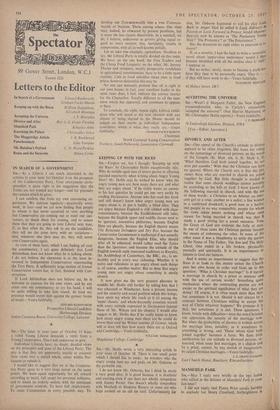DIVORCE AND AFTER
SIR,—One aspect of the Church's attitude to divorce
appears to be often forgotten. She bases her ruling on the remarriage of divorced persons on the words of the Gospels (St. Matt. xix, 6; ,St. Mark x, 9)' 'What therefore God hath joined together, let not man put asunder.' With that the Christian can have no quarrel. Where the Church errs is that she pre' sumes those who are married in church are joined together by God. But little thought is needed to realise that some church weddings cannot possiblY be according to the will of God. I have known of
the following married in church, and with the use of these words : a' Christian to an Atheist; an inno- cent girl to a rout, another to a sadist; a fine woman to a confirmed drunkard; a good man to a harlot; two people in no way compatible; people for whom the vows taken meant nothing and whose only reason for being married in church was that it made a good setting for a social occasion. True, the Grace of God can overrule the folly of man• In one of these cases the Christian partner became the means of redeeming the other. In some of the other cases it was a blasphemy to unite the parties in the Name of The Father, The Son and The Holy Ghost. One ended in a life broken, physically, mentally and spiritually. It is an impertinence to impute to God our failures.
And it seems an impertinence to suggest that the State is at fault in this matter unless the Church puts her own house in order and faces up to the question : 'What is Christian marriage?' Is it merely a marriage in church by a priest or minister and with the use of certain words? Something quite mechanical where the contracting parties are not awake to the spiritual significance of what they are doing? Of course, it is often much more than that, but sometimes it- is not. ShOuld it not always be a contract between Christians willing to accept the way of Christ whatever happens? We presume it is that, but sometimes it is not. These questions, 1 know, bristle with difficulties—even the non-Christian can appreciate the sanctity of the marriage vow. But when the probability of divorce is written across the marriage lines, invisibly, as it sometimes is, something is wrong, and `Those whom God hath joined together' becomes a farce. We have little justification for our attitude to divorced persons, re- married, when some first marriages, in a church and by a priest, cannot, by any stretch of imagination, be called Christian marriages.—Yours faithfully, I. G. GRANT FLEMINO


































 Previous page
Previous page